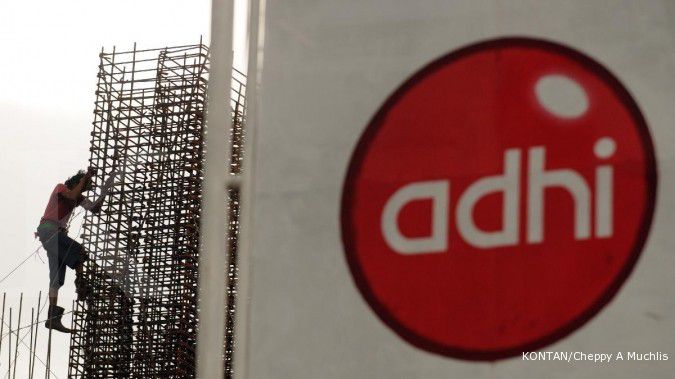JAKARTA. State-owned construction company PT Adhi Karya (ADHI) is proposing a rights issue as part of its efforts to raise funds for the development of a light rail transit (LRT) system in the capital city of Jakarta.
Earlier, the company planned to build a monorail network — a proposal which had already gained approval from the House of Representatives and been included in the 2015 state budget.
“We switched our plan from building a monorail to developing an LRT network because the Jakarta administration chooses duo-rail rather than monorail. It is not simply because the administration canceled the monorail project,” ADHI president director Kiswodarmawan said at a press conference after the company’s general shareholders meeting on Friday.
In its previous proposal to the House, ADHI planned to spend the Rp 1.4 trillion (US$107.36 million) in state capital injection to develop the Cibubur-Cawang-Senayan monorail project in Jakarta.
According to the proposal, the total investment needed for the project is estimated to hit around Rp 9.9 trillion, of which Rp 2.7 trillion will be obtained through rights issues and Rp 1.4 trillion will come from the stimulus fund.
On Friday, Kiswodarmawan said the company’s ongoing study revealed that the first phase of the Cibubur-Cawang-Semanggi-Grogol LRT project would need around Rp 9 trillion to Rp 10 trillion of total investment.
Out of the total amount, the company has secured Rp 1.4 trillion from the state, while the remaining
Rp 7 trillion will be financed by bank loans and around Rp 2 trillion to Rp 3 trillion from its own equity.
Kiswodarmawan said the publicly listed company was expecting that the government would buy its shares in the rights issue with the Rp 1.4 trillion stimulus fund. As a legal basis for the mechanism, the company will need the government to issue a governmental regulation (PP), Kiswodarmawan added.
The company is currently proposing the governmental regulation as well as requesting the Financial Services Authority’s (OJK) permission for the rights issue, which is expected to be carried out at the end of the first half.
Kiswodarmawan said the first phase of the project — expected to be launched in the fourth quarter of this year — would cover tracks between Cibubur and Cawang in East Jakarta, Semanggi in South Jakarta as well as Grogol in Central Jakarta. The company has also proposed the second phase, which would connect East Bekasi and Cawang.
The company expects that the LRT will have a capacity of 360,000 passengers per day, traveling the distance between Cibubur and Cawang within 15 minutes. It will cost at least Rp 15,000 per passenger. Meanwhile, the Cawang-Grogol route will cost more and take 20 minutes at the most, Kiswodarmawan said.
“The lines are the most traveled routes for people to commute from and to Jakarta, according to research conducted by our consultant,” Kiswodarmawan said.
Kiswodarmawan said ADHI had proposed to the Public Works and Housing Ministry as well as state-owned toll operator Jasa Marga the idea of building the tracks alongside the Cibubur-Cawang toll road.
“Jasa Marga, as the owner of the land, has given a positive recommendation to us. The public works ministry has also agreed if Jasa Marga supports us,” Kiswodarmawan said.
Kiswodarmawan said the company would study the LRT production license, whether from Canadian LRT vehicle manufacturer Bombardier or Japanese Hitachi, before starting to produce the trains.
Meanwhile, the operation will be handled by a joint-venture company in the future, with a consultancy from Singapore Mass Rapid Transit (SMRT), Kiswodarmawan added.
“We admit that the project is difficult, because we don’t have any experience in building LRT. We also acknowledge that we will experience a loss in the first year of operation, so we will develop properties along the LRT tracks and stations to maintain recurring income,” Kiswodarmawan said.
Kiswoyo Adi Joe, an analyst from Investa Saran Mandiri, said the LRT project would be beneficial to ADHI due to a high need for better public transportation in Jakarta as well as a positive trend in the construction sector.
“However, the company will need a thorough feasibility study on whether it will be profitable enough for them with the fares proposed.
It will also need to ensure that the land acquisition and clearing will be carried out smoothly,” Kiswoyo said.
On Friday, ADHI paid Rp 64.81 billion in dividends, with Rp 53,972 per share. The paid amount is equal to 20 percent of its total net profit of Rp 324.1 billion last year, a 20.2 percent decrease from Rp 405.9 billion in 2013.
Kiswodarmawan said the company was aiming to post Rp 440.1 billion in net profits this year, which will be mainly contributed by its subsidiaries Adhi Persada Properti and Adhi Persada Realti. (Grace D. Amianti)
/2011/12/11/1356862421p.jpg)










